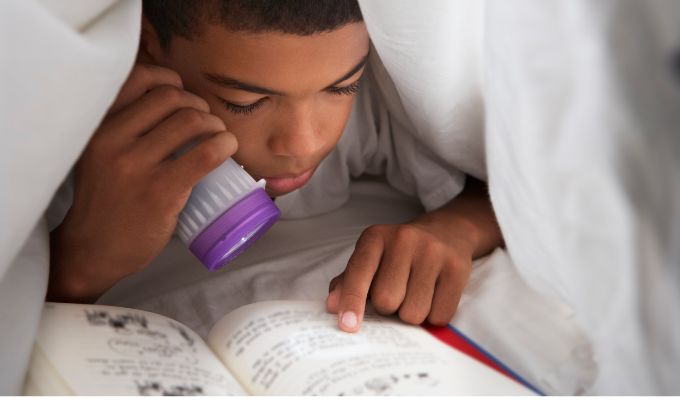Let’s face it, most parents look forward to the evening when their children have fallen asleep and serenity has been restored. However, it is not uncommon for children to derail nighttime plans and refuse to sleep.
Sometimes, children can go through phases where they have boundless energy and do everything they can to avoid bedtime. But the problem could be that your toddler has overslept the night before, or they’ve just not expelled much energy that day, so don’t feel tired when it comes to bedtime.
That’s why routine is so important, so your child is getting the optimal hours of sleep each night – that means awake in the morning around the same time and bedtime at the same time at night.
Also, try to fill your toddles day with fun and learning, so that when bedtime comes, they’re not bursting with energy and excitement, as you’ll have used most of it during the day.
Oftentimes, parents find school holidays particularly difficult when it comes to doing to bed and sleeping through the night. Because when they’re off nursery or school for an extended time, they can sleep in late and there’s less mental and physical activity going on.
How Much Sleep do Children Need?

“Are they sleeping through the night yet?” – is one of the most frequently asked questions by friends and family of new parents.
This question frequently puts new parents under pressure and creates expectations that are rarely satisfied, and the last thing you want is your toddler picking up on any stress, anxiety, or pressure you may be feeling.
Sounds dramatic, but it is true – you want to keep a calm, safe, and secure feeling around your children. Keep in mind, the older children get, the less sleep they need. As your child transitions from newborn, to baby, to toddler, child, then teenager, their sleeping needs will change.
You may not notice the time flying by. One minute they’re a little bundle snoozing 16 hours a day, then they’re on their feet and requiring less sleep.
It’s a good idea to know to optimal sleep ranges for each age so that you can adjust “time to get up” and “time for bed” times.
Sometimes, parents overestimate the need for sleep and put their child to bed too early, although this serves other objectives than sleeping. Kids require the following average hours of sleep per night:
- Up to 3 months: 16-18 hours
- 4-5 months: 14 – 15 hours
- 6-12 months: 13 hours
- 1-4 years: 12 hours
- 5-6 years: 11.5 years
- 7-9 years: 11 hours
- 10-11 years: 10.5 hours
- 12-13 years: 10 hours
- 14-16 years: 9 hours
Of course, this is not absolute. Some kids require a little more or less each night, but it gives you an idea to work with and shows how their sleeping needs can change as they age.
Please keep in mind that tiny children, like adults, have varied sleeping demands. Some people require less, while others require more, and it can also depend on lifestyle. As a result, it is presumed to be +/- 2 hours.
Environment
Your toddler should have a safe, clean, and comfortable place to sleep. That means suitable bed clothing, a comfortable cot bed and mattress, and a nightlight or projector can create a very calming ambience to help your child want to go to bed.
Toddler refuses to sleep

Babies, in particular, lack a day-night rhythm, which explains why some babies sleep a lot during the day but not at night, much to their parent’s annoyance. However, the youngster gradually adjusts to the parents’ rhythm – patience is essential!
Is the child unable to sleep? There are probably many causes for this, and we don’t have a magical solution. It could be anything from a sleep recession phase kicking in, to excitement about an event, or simply oversleeping the night before.
Many children must also converse the day following in order to clear their minds. We are also aware of this. How frequently do we stay up because the thinking carousel is still spinning?
As a result, a sudden “BED, NOW” is met with resistance, and falling asleep is improbable. In contrast to infants and babies, who require their parents’ assistance to navigate the daily routine, adults may (more or less) shut themselves off. Regular daily routines and rituals aid in the prevention of sleep difficulties. A constant schedule, especially in the evening, might assist the children to prepare for bedtime.
Not only should the time before going to bed be pleasurable, but so should going to bed. As a result, going to bed should never be threatened as a punishment. Baby or toddler needs to feel at ease in order to get a good night’s sleep. But it can’t accomplish that if it’s a negative punishment.
Everything revolves around timing!
Let’s start with the most obvious, yet far from easy care – You have a tired child that doesn’t want to sleep. When it comes to sleep, timing is important. Aside from the timing factor, it is also critical that the baby or toddler is sleepy.
Now, tiredness can cause irritability, and that irritable feeling your child has can cause resistance to bedtime. A tired child – just like an adult – can be grumpy. But, toddlers do not know that these feelings are caused by lack of sleep, so they can play up – it’s your job as a parent to stay calm, even in the face of a tired angry child.
So pay less attention to the clock and more attention to the child’s signs. There’s nothing wrong with eating and then singing or reading a book in quiet. The parents can then put the youngster to bed at the first hint of trouble. Sounds simple, but it isn’t always – we know!
Should Toddlers Fall Asleep Alone?
“My child does not sleep by himself.” Is that something that bothers you? No? Then everything is fine, and you no longer have to deal with it. It’s also fine if you don’t have the stamina to offer bedtime advice every night. Everyone in the family has vital needs, not just the child.
Try to come up with a solution; perhaps mum or dad take over every other evening? Then, perhaps, everything will go more smoothly because even the youngest children will notice whether their parents are present and will want to be escorted to bed.
When do children sleep through the night?
“My child does not sleep all night.” Sleep develops in stages and is closely related to cognitive development. Babies, in particular, are unable to sleep through the night. Babies do not sleep through the night since it is in their nature. They check in the middle of the night to see if everything is good and if their carers are still present.
Babies, in particular, but even small children, require calories at night due to brain growth that occurs during the night. That is why they are hungry and desire to breastfeed or drink from a bottle.
Furthermore, the phrase “sleep through” should be used with caution. What exactly does that mean? We adults, too, do not sleep through the night. We have, however, gained the ability to swiftly fall asleep again.
Children only gradually learn that they can fall asleep on their own. So your child doesn’t sleep through the night? This is quite normal. Of course, some newborns sleep through the night. Around the time of their first birthday, some families start going to bed, while others take a bit longer.
Should You Let Your Child Cry to Sleep?
No, I do not believe in letting your child cry and steam themselves to sleep. Sure, they’ll eventually tire themselves out, but what if they’re in pain or discomfort and need help? Ignoring a screaming child is not a good habit to get yourself into a bedtime.
Please seek assistance if sleep is an issue for the entire family. Your paediatrician can be the point of contact; he can determine whether there is an organic cause for your child’s inability to sleep. However, yelling is not an option!
Babies and toddlers do not cry to irritate or manipulate their parents. They are terrified, and shouting is their sole means of communicating that they are not well.
If you give in to its cries, it will learn that its primary caregivers are uninterested in calming it down. Of sure, the child will eventually cease sobbing. This is not because it has “comprehended” anything, but rather because it enters “emergency mode” and saves energy.
It is perfectly reasonable that it is exceedingly unpleasant when a youngster refuses to sleep because he or she is screaming and screaming and screaming. If you can no longer securely place the child down, exit the room and take a deep breath! After then, you might be able to settle your baby down again.
Sleep coaches are another resource you can use as a family in addition to the paediatrician. They consider all needs and assist you in finding a solution. This is also an option if sleep support is time-consuming and exhausting.
2 year old not going to sleep until 11 pm?
So it’s 11 o’clock in the evening and it feels like you’re going to be awake past midnight at this rate. Your 2-year-old has decided they just don’t want to sleep and it’s 11 pm already.
Two-year-olds need around 12 – 14 hours of sleep a night. That means, they should be up at around 8am and in bed for 8 – 9pm. You need to stick to this routine of “time to get up” and “time for bed”. Try to fill their day with plenty of activities to keep their brains active and don’t let them nap too long, if at all, during the day. This will help them become tired and ready to fall asleep come bedtime.
If you’re going everything right regarding morning and bedtime routine, and they’re still not sleepy come 8pm, then it could simply be a sleep regression phase that they’re going through, which will pass in time. Always, if you’re child is having persistent sleeping issues, speak to a doctor.



